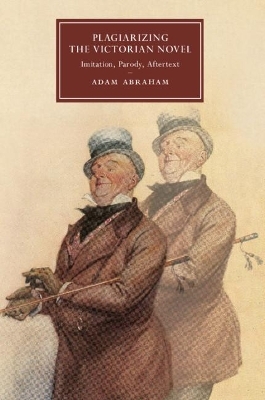
Plagiarizing the Victorian Novel
Imitation, Parody, Aftertext
Seiten
2021
Cambridge University Press (Verlag)
978-1-108-71724-3 (ISBN)
Cambridge University Press (Verlag)
978-1-108-71724-3 (ISBN)
Explores the notion of plagiarism in Victorian fiction and how many writers of this period stole, altered or parodied the characters and plots of previous texts. This book will appeal to students and researchers of nineteenth-century literature and culture, and readers interested in issues of plagiarism, copyright, and intellectual property.
How can we tell plagiarism from an allusion? How does imitation differ from parody? Where is the line between copyright infringement and homage? Questions of intellectual property have been vexed long before our own age of online piracy. In Victorian Britain, enterprising authors tested the limits of literary ownership by generating plagiaristic publications based on leading writers of the day. Adam Abraham illuminates these issues by examining imitations of three novelists: Charles Dickens, Edward Bulwer Lytton, and George Eliot. Readers of Oliver Twist may be surprised to learn about Oliver Twiss, a penny serial that usurped Dickens's characters. Such imitative publications capture the essence of their sources; the caricature, although crude, is necessarily clear. By reading works that emulate three nineteenth-century writers, this innovative study enlarges our sense of what literary knowledge looks like: to know a particular author means to know the sometimes bad imitations that the author inspired.
How can we tell plagiarism from an allusion? How does imitation differ from parody? Where is the line between copyright infringement and homage? Questions of intellectual property have been vexed long before our own age of online piracy. In Victorian Britain, enterprising authors tested the limits of literary ownership by generating plagiaristic publications based on leading writers of the day. Adam Abraham illuminates these issues by examining imitations of three novelists: Charles Dickens, Edward Bulwer Lytton, and George Eliot. Readers of Oliver Twist may be surprised to learn about Oliver Twiss, a penny serial that usurped Dickens's characters. Such imitative publications capture the essence of their sources; the caricature, although crude, is necessarily clear. By reading works that emulate three nineteenth-century writers, this innovative study enlarges our sense of what literary knowledge looks like: to know a particular author means to know the sometimes bad imitations that the author inspired.
Adam Abraham is a Postdoctoral Fellow at Virginia Commonwealth University. He is the author of When Magoo Flew: The Rise and Fall of Animation Studio UPA (2012) as well as articles on Victorian literature and culture.
Prologue; 1. The Pickwick phenomenon; 2. Charles Dickens and the pseudo-Dickens industry; 3. Parody; or, the art of writing Edward Bulwer Lytton; 4. Thackeray versus Bulwer versus Bulwer: parody and appropriation; 5. Being George Eliot: imitation, imposture, and identity; Postscript; Posthumous papers; Aftertexts.
| Erscheinungsdatum | 21.06.2021 |
|---|---|
| Reihe/Serie | Cambridge Studies in Nineteenth-Century Literature and Culture |
| Zusatzinfo | Worked examples or Exercises; 1 Halftones, black and white; 5 Line drawings, black and white |
| Verlagsort | Cambridge |
| Sprache | englisch |
| Maße | 152 x 226 mm |
| Gewicht | 443 g |
| Themenwelt | Geisteswissenschaften ► Sprach- / Literaturwissenschaft ► Anglistik / Amerikanistik |
| Geisteswissenschaften ► Sprach- / Literaturwissenschaft ► Literaturgeschichte | |
| Geisteswissenschaften ► Sprach- / Literaturwissenschaft ► Literaturwissenschaft | |
| ISBN-10 | 1-108-71724-1 / 1108717241 |
| ISBN-13 | 978-1-108-71724-3 / 9781108717243 |
| Zustand | Neuware |
| Haben Sie eine Frage zum Produkt? |
Mehr entdecken
aus dem Bereich
aus dem Bereich
Poetik eines sozialen Urteils
Buch | Hardcover (2023)
De Gruyter (Verlag)
CHF 83,90
Buch | Softcover (2024)
belleville (Verlag)
CHF 27,95


